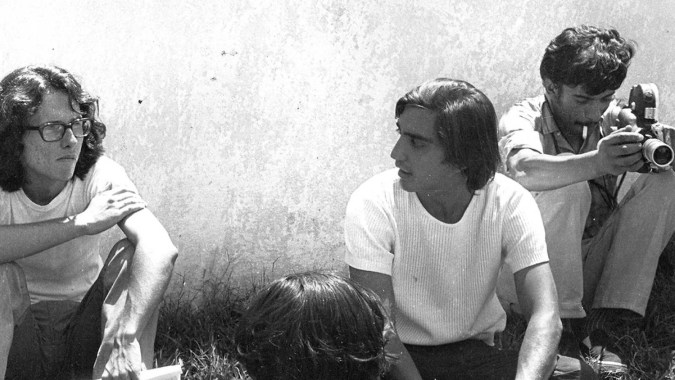You may not have heard of Luis Ospina, and that’s okay. Until now the seminal Colombian director and founding member of the Cali Group has been known only to the most hardcore of Latin American cinenerds, but that doesn’t take away from the indelible imprint the man has left on generations of Colombian filmmakers. From his classic meta-mockumentary Agarrando Pueblo (1978) to his portraits of Colombian artists like La desazón suprema: retrato incesante de Fernando Vallejo (2003), Ospina has developed a unique voice and approach to the medium, characterized by his playful humor and incisive intelligence.
At 69-years-old, Ospina has weathered his fair share of storms, and sadly today he is only a few surviving members of the original Cali Group, which included cinephile cult novelist Andrés Caicedo and fellow filmmaker Carlos Mayolo. It is this status as a survivor that inspired him to make his latest feature documentary, an epic three-and-a-half-hour look back at the artistic legacy of the Cali Group entitled Todo comenzó por el fin (It All Started at the End).
Initially, Ospina set out to explore the group’s revolutionary impact on Colombian art, cinema, and literature as both their city and country were besieged by an unstoppable wave of drug violence, but life intervened suddenly and forcefully. On the first day of production, Ospina was diagnosed with cancer. Faced with the prospect that this would be his last film, Todo comenzó por el fin became just as much about the present as the past, and just as much about the imminence of death as it was about survival.
To mark the film’s New York premiere as part of The Film Society at Lincoln Center’s Neighboring Scenes Latin American film showcase earlier this year, Ospina was on hand for a Q&A session filled with his characteristic warmth, humor, and intelligence. Here are some highlights:
On Adapting to the Circumstances
In a way, when I started making this film I thought that everything I had made before was a work in progress, or material for this film, because I have dealt with some of the subjects of this film, but here I put everything together. And of course at the beginning the film was only about the group, it wasn’t a very autobiographical film in itself. That was due to the simple fact of being diagnosed with cancer, which changed everything. So it’s really a film about death, near death.
On Thinking He Would Die in the Middle of the Documentary
As soon as I got the news that I was sick, I decided that I would not only make this film about my past, but about my present. And being sick is my present. So my friends started documenting that, recording me. And that’s how it came about. In the beginning, I thought the film was a film told by a survivor, then when I got sick and almost died I started thinking that it was a film of a dying man in a way, because I didn’t know how the end would be. In a way, I say it’s a suspense documentary because you don’t know if the director’s going to die in the middle of the documentary or not.
On Scrapbooking ‘Cause You Know It’ll Come in Handy
“At one point I thought it was going to be my last film, but now I say it’s my latest film.”
All my life I’ve saved things, you know. Photographs, videos, films, everything, with that attitude one has that says “Maybe some day this will become useful for something.” And they sort of stay there, these archives, and they age like wines, and there’s the moment that’s the right moment to drink them, to use them.
On Making Films Like Books
I like my films to be like a book, because I think the concept of the duration of films has changed. I think many people see films like they are reading a book. They can read the prologue and put it away, then go back to it. Because the whole film exhibition concept has changed since the multiplex and all these things, and now with the TV series it has changed more.

On Cali’s Special Relationship with Cinema
I don’t know why people from Cali have the cinema within them, because the first silent feature film [in Colombia] was made in Cali, 1921, which was María. The first sound film was made in Cali, the first color film was made in Cali, the first anti-imperialist film was made in Cali. So I don’t know, maybe there’s something. I have my own theory that maybe we have talent to make films in Cali because we move slowly but our eyes move rapidly.
On Being Obsessed With Death
Yes, I’m obsessed with death. I think any documentary filmmaker has to be obsessed with death because we’re in the process of filming things that are dying. Everything that we shoot is going to change. We’re filming buildings and they’re going to be torn down. If you’re filming a person he’s going to die. So we’re working with memory, and for me the absence of memory is death. So as documentary filmmakers we’re struggling against death, against being forgotten, against oblivion.
On His Current Health
At one point, I thought it was going to be my last film, but now I say it’s my latest film.



